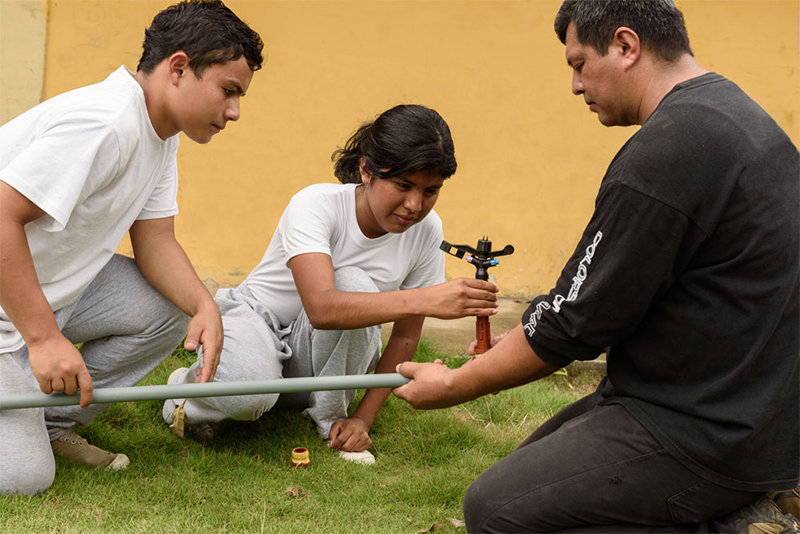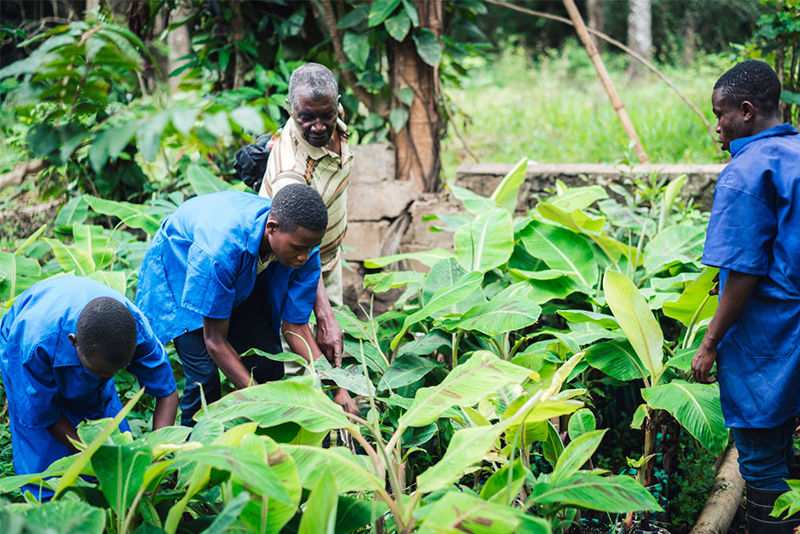What better occasion than World Youth Skills Day to celebrate Technical and Vocational Education and Training (TVET) teachers?
With this year’s theme being “learning to learn for life and work”, focusing on TVET teachers is more relevant than ever as they are tasked with preparing youth with relevant skills for employment, decent jobs, entrepreneurship and active citizenship. TVET teachers also have a special role in achieving targets 4.4. and 4.7. of SDG 4. Just like teachers at other levels of education they deserve initial teacher training and continuous professional development of outstanding quality (TTF, 2018).
Diverse TVET workforce, diverse professional development needs
The TVET workforce is complex. It includes a range of roles, going from core subject teachers who teach mathematics, science, languages, humanities etc. to students regardless of the technical specialisation of the TVET programme, to technical teachers who teach the theory of technical subjects in many different specialisations, and practical teachers who are responsible for applied training in workshops and labs, using tools, equipment and machines relevant to various occupational domains.
While they may share the common objective of preparing youth for work and life, their functions, pathways into the profession, working conditions and salaries vary significantly. So do their needs for professional development. As diverse as they are, these needs must be addressed because effective interaction between TVET teachers and students lies at the heart of quality technical and vocational education and training. Indeed, an overall improvement in skills for employability and citizenship can only be realised if there is an improvement in the quality, effectiveness and relevance of teaching and, by extension, in the quality, effectiveness and relevance of TVET teacher professional development systems (ILO, 2015).
That is why Teacher Task Force member VVOB – education for development is currently strengthening TVET teacher professional development in the Democratic Republic of the Congo (DRC), Ecuador, Suriname and Uganda. VVOB Technical Brief #4, “Enhancing adolescent wellbeing, learning and opportunities”, showcases our work in each of these countries, plus Cambodia and Rwanda where VVOB focuses on general secondary education.
Improving TVET teacher qualifications

Increasing the supply of well-qualified TVET teachers is key to achieving SDG 4. It is encouraging, therefore, that the Ministries of Education of Ecuador, Suriname and, recently, Uganda have favoured the improvement of TVET teacher qualifications as an area of cooperation with VVOB.
In Ecuador, the Ministry of Education not long ago introduced a career ladder that links teacher qualifications to salary grade progression and career progression opportunities (IDB PREAL, 2017; UNESCO IIEP, 2017). Naturally, this increased the demand for teacher professional development, also among TVET teachers, many of whom have (technical) skills qualifications, but no pedagogical degree. The challenge? None of the existing teacher training institutions offered programmes specifically tailored to TVET teachers.
To address that gap in the TVET teacher support system, VVOB partnered with the Universidad Nacional de Educación (UNAE) in 2014, and the Pontificia Universidad Católica del Ecuador (PUCE) and the Universidad Técnica de Manabí (UTM) in 2017 (Vanwildemeersch et al., 2016). The objective was to establish a pedagogical posgrado programme for TVET teachers in line with the accreditation requirements of the Council for Higher Education. The UNAE, in the meantime, has enrolled its first cohort, and as many of them are practicing teachers, we expect to see school-level quality improvements soon.
In Suriname, too, the majority of student teachers enrolled at the national TVET teacher training college Lerarenopleiding Beroepsonderwijs (LOBO) are already in service. The coursework aims to strengthen technical skills in various specialisations as well as develop TVET teachers’ pedagogical and didactic competencies. To equip student teachers with skills that match evolving industry needs, LOBO brings in company experts as part-time teacher trainers for practical courses.
It is proving more difficult, however, to make sure that LOBO graduates apply methods of instruction that also match the needs of the particularly vulnerable student population in lower secondary vocational education and training (lager beroepsonderwijs, LBO). Even qualified TVET teachers would find it difficult to actively engage students in learning and address what they see as adolescents’ ‘problem behaviour’. LOBO had not properly familiarised them with student-centered instructional methods or with tools to create a classroom atmosphere that motivates students and enhances their learning and wellbeing.
VVOB is now supporting LOBO in a curriculum reform process to improve these aspects of Suriname’s TVET teacher qualifications. LOBO’s teacher trainers are collaborating in curriculum design teams coached by VVOB – a way of working that is proving to positively affect both the professional development of LOBO staff as well as the implementation of the curriculum innovation (Voogt et al., 2016).
Increasing the supply of well-qualified TVET teachers requires deep change and quality improvement at the level of teacher training institutions. If the goal is to prepare youth with relevant skills for employment, decent jobs, entrepreneurship and active citizenship, it is crucial to involve TVET teacher trainers as key stakeholders.
Relevant continuous professional development

In many ways TVET teachers’ need for continuous professional development (CPD) is no different from that of their colleagues at other levels of the education system. CPD is best when there is an intentional focus on discipline-specific curriculum development and pedagogies; models of effective practice are used; coaches and expert support are available to offer feedback and stimulate reflection; and when teachers are directly involved in designing and trying out new teaching strategies and given ample opportunity to share ideas and collaborate in their learning, preferably in a sustained manner and in job-embedded contexts (Darling-Hammond et al., 2017).
What is more unique about effective CPD for TVET teachers, is the importance of setting up close linkages with local industry and services to make sure that teachers stay aware of the evolving needs of the world of work. VVOB is piloting different ways of doing so in Ecuador and the DRC.
In the DRC, the focus of VVOB’s work is on strengthening entrepreneurship education in the secondary agricultural technical schools of Bas-Fleuve, Cataractes and Lukaya, three educational provinces in the west of the country. Though there are some large agribusinesses in the area, most of the economy here is informal and agricultural activity is mostly small-scale subsistence farming.
Together with the specialized teams of the Inspecteur Principal Provincial (IPP), VVOB is introducing new modalities for the continuous professional development of the agricultural TVET teachers who give technical, practical and entrepreneurship courses. The purpose is to complement the short trainings traditionally provided by the IPP with CPD that is more practice-oriented and that puts TVET teachers in direct contact with relevant actors in the rural economy. School leaders and teachers at selected pilot schools created a map of the surrounding economy and identified pockets of expertise that can help to improve the delivery of agri-entrepreneurship education.
Admittedly, in the given context it is difficult to establish long-term partnerships with industry. To see quick effects, it is key to opt for low-threshold approaches, such as study visits to nearby agri-businesses and motivational talks or round tables with agri-entrepreneurs or key representatives of farmers’ groups and associations. Even such loose forms of social dialogue are very valuable, as long as the focus remains on specific content relevant to the curriculum and teachers are also given time and space to reflect on new insights together. That is why VVOB also supports schools in the establishment of so-called unités d’action pédagogique for agri-entrepreneurship education – school-based professional learning communities where TVET teachers collaborate to mainstream entrepreneurship education across their courses.
In more mature economies, such as Ecuador, the potential for consultation between TVET and industry is far greater. But here, too, the importance of building trust between the supply and the demand side of skilling cannot be underestimated.
Observations from industry about the depth of skills mismatch can be quite uncomfortable for those working in TVET and they may not be very helpful for TVET teachers working in under-resourced schools with limited support systems.
To build linkages and trust, the Ministry of Education and VVOB are testing a model for structured dialogue and collaboration between clusters of TVET schools that offer the same specialisation – e.g. agriculture, construction, tourism, electrical installations, … -- and industry partners. For now, the roll-out is taking place in Canton Quito and the provinces of Esmeraldas, Manabí and Santo Domingo de los Tsáchilas. The shared goal is to align skills supply and demand, so that the productive sector can rely on a well-trained entry level workforce. Collaboration can revolve around internships for students, updating of teaching materials, and do so. Specifically for TVET teachers, access to discipline-specific technical upskilling provided by industry is an important gain.
VVOB and the Ministry have, for instance, negotiated teacher training from CAPACITUR, a tourism industry centre of expertise, IdealAlambrec Bekaert, a construction company, and Schneider Electric, which provided training to teachers in electrical installations and urban electrification.
The big plus? Industry provides TVET teachers with an opportunity to engage in competency-based learning, the same style of learning that teachers are designing for their students. If it can build on quality initial training, this is the kind of CPD that will prepare the TVET workforce of the future.
This blog was written in the framework of World Youth Skills Day (WYSD) 2019’s theme “Learning to learn for life and work”. WYSD highlights the importance of Technical and Vocational Education and Training (TVET) in providing youth with the opportunities to develop their competencies and accelerate their transition to work.
VVOB - education for development is a member of the Teacher Task Force and currently sits on its Steering Committee as a representative of the International NGOs and CSOs constituency.